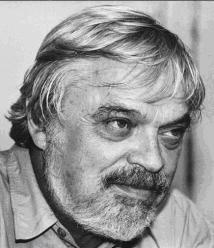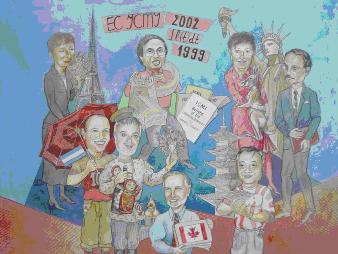 The website is in construction. New files will be uploaded as soon as they are available.
The website is in construction. New files will be uploaded as soon as they are available.
IGOR FEDOROVICH SHARYGIN
Moscow 1937 - Moscow 2004

- Brief scientific biography
- Contributions to Education
- Relevant bibliography
- Publications on the teaching of mathematics
Brief scientific biography
Igor Fedorovich Sharygin was born in Moscow in 1937. He lived in Moscow all his life, save one year during World War II when he evacuated to Kazan in 1942. He passed away on March 12, 2004.
As a high school pupil Sharygin took part in various mathematical Olympiads and joined the activities of the mathematical circle run by some professors of Moscow State University. His ability and talent in mathematics had already been noticed by that time by Nikolai Sergeevich Bakhvalov (1934-2005), who was to become his Ph.D thesis supervisor. Bakhvalov said of him:
"Igor Fedorovich Sharygin was a member of a mathematical circle which I ran for high school pupils. The circle produced a lot of known mathematicians. Igor was distinguished among other participants by a large modesty coefficient: the ratio of someone's real mathematical abilities to his opinion about them."In 1954 Sharygin entered the Department of Mathematics and Mechanics of Moscow State University. After completion of his undergraduate study with honours in 1959 he continued his postgraduate study at the same University. In 1965 he defended his Ph.D thesis, "The lower bounds in the theory of integration and approximations on certain functional classes", written under the supervision of N.S. Bakhvalov.
Until 1972 Sharygin worked in the Department of Mathematics and Mechanics and the Department of Applied Mathematics and Cybernetics of Moscow State University. He had to leave the University when he signed a letter in favour of a dissident mathematician, after which he taught mathematics in various institutions of higher learning in Moscow. In 1985 he became a senior researcher in the Moscow Institute of Educational Systems and Methods of the Russian Academy of Education (formerly the Academy of Pedagogical Sciences), and was later promoted to the position of head researcher. Until the very end of his life he continued writing books and struggling for the betterment of mathematics education in Russia, over which he harboured deep concerns about what he saw as ill effects brought about by `globalization' of education and society.
Contributions to Education
Sharygin wrote over thirty books for school pupils, especially on geometry. His first book Problems in Plane Geometry (in Russian, 1981), followed by its sequel Problems in Solid Geometry (in Russian, 1983), quickly became very popular and has been translated into several languages. He continued to publish from 1989-1999 the books Solving Problems in Mathematics, Volume 1 and 2 (in Russian), Visual Geometry (in Russian), Mathematical Medley (in Russian), and some textbooks on plane geometry and solid geometry for various grades. In 1984 he became Editor-in-Chief of the problem section of the journal Mathematics in School. In his many books on mathematical problems, the level of complexity ranges from that of ordinary school problems to that which requires creative thinking. Moreover, the majority of the problems are original problems he himself composed.

In 1970 at the initiative of Andrey Nikolaevich Kolmogorov (1903-1987) and Isaak Kostantinovich Kikoyin (1908-1984), the famous magazine on elementary mathematics for school pupils, Kvant, was founded. Since the very first days of the existence of Kvant Sharygin worked actively on it, writing articles and composing problems regularly. As a long-time editor of the magazine he later became the Russian head of the mathematics department of its sister-magazine Quantum, published in English in the USA. He took part in the activities of mathematical Olympiads and helped to prepare the Russian teams for the International Mathematical Olympiads. In 1999-2002 he was a Member-at-Large of the ICMI. Bernard R. Hodgson, who served as Secretary-General of the ICMI in those years, recalled an incident that revealed the lively and witty mind of Sharygin. In the last committee meeting held in Paris, Sharygin brought an amusing drawing that depicted all executive members, each associated with a national icon!
Sharygin had a special passion for geometry. He once wrote:
"Geometry is a phenomenon of human culture. ... Geometry, as well as mathematics in general, helps in moral and ethical education of children. ... Geometry develops mathematical intuition, introduces a person to independent mathematical creativity. ... Geometry is a point of minimum for the distance between school mathematics and the mathematics of high level.Particularly noteworthy is the emphasis he placed on the moral value and civic importance of learning mathematics in general and of geometry in particular:
Native language and literature, physical training, and mathematics are three crucial components of secondary education. Of all these subjects, it is mathematics, and especially Geometry, that is concerned with the widest range of long- and short-term educational goals."
"Learning mathematics builds up our virtues, sharpens our sense of justice and our dignity, strengthens our innate honesty and our principles. The life of mathematical society is based on the idea of proof, one of the most highly moral ideas in the world."He was of the opinion that people who are mathematically literate and understand what proof means cannot easily be manipulated, and that although mathematics and state authority are two incompatible things, rational sovereigns often turn to mathematicians for assistance in difficult moments.
Relevant bibliography
- Biographical information on Igor Fedorovich Sharygin, ICMI Bulletin, No. 47 (December 1999)
- In memoriam: Igor F. Sharygin (1937-2004), ICMI Bulletin, No. 55 (December 2004), 67-72
Publications on the teaching of mathematics
I.F. SHARYGIN, 2004, On the concepts of school geometry, in J. WANG, B. XU (Eds.), Trends and Challenges in Mathematics Education, Shanghai, East China Normal University Press, 43-51
(Many papers of I.F. Sharygin on mathematics education in Russian can be found online.)
Author
SIU, Man Keung
Department of Mathematics, University of Hong Kong
mathsiu@hkucc.hku.hk
